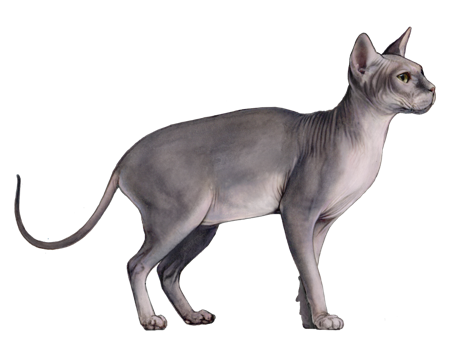
American Wirehair
American Wirehairs are intelligent, good-natured cats and popular family pets. Though they love spending time with their humans, they're relatively independent and comfortable doing their own thing.
Interested in discovering if your cat is an American Wirehair?
Check out Wisdom Panel's DNA test.
American Wirehair Traits
General Appearance
American Wirehairs are medium-to-large cats with springy, wiry coats. They have well-balanced, muscular bodies and sweet expressions.
Coat and Colouring
Wirehairs come in all colors and patterns. Made of crimped, hooked, or bent hairs, their medium-length coats are very dense and coarse but relatively soft to the touch.
The wiriness comes in degrees and varies from spiky to curly. And the gene that causes it is an incomplete dominant—meaning the dominant gene doesn't always totally mask the recessive gene. As a result, some kittens in a litter may have straight coats.
Distinctive Physical Traits
The American Wirehair's key features include a round head with prominent cheekbones, a well-developed muzzle, medium ears with slightly rounded tips, and large, round eyes.
American Wirehair Temperament
American Wirehairs are people-oriented cats that quickly turn strangers into friends. Their relaxed, gentle nature and patience with kids make them ideal pets for families.
Though laid-back, Wirehairs are quite playful and remain spunky even into their senior years. When not engaging in games with their humans, they like to watch birds from the window and keep an eye on the neighborhood from a high shelf or perch. When it's time to relax, some Wirehairs will curl up in a lap, but others prefer to hang out on nearby furniture.
True to their farm cat roots, Wirehairs are diligent hunters. (Insects, beware.)
American Wirehair History
The American Wirehair originated in 1966 in upstate New York. It was then and there that a farm kitten with a sparse, wiry coat and crinkly whiskers was born to two normal-coated parents. Local cat breeder Joan O'Shea took the kitten and bred him to a neighboring female cat, resulting in a litter of similar wirehaired kittens. The second round of breeding confirmed that the gene causing the wire coat was dominant.
O'Shea sent hair samples to a British geneticist, who concluded that they differed from the hair of other curly-coated breeds—such as the Cornish Rex or Devon Rex. In other words, O'Shea had stumbled upon a novel gene mutation.
This new breed most closely resembled the American Shorthair, which breeders used for initial outcrossings. The CFA accepted the American Wirehair for registration in 1967 and granted Championship status in 1978. And to this day, no other country has reported the wirehair mutation. It is truly an American original.
American Wirehair Care
Nutrition
American Wirehairs need a high-quality diet formulated for their current life stage (e.g., kitten, adult, senior).
Obesity is on the rise in cats and can lead to other serious health issues. To keep your cat at an appropriate weight, measure out meals and reduce portions if necessary. And don't forget to account for treats. As a guideline, they should make up no more than 10% of a cat's calories.
Lastly, all felines need access to fresh, clean water around the clock.
Grooming
Oil from American Wirehairs' skin can cause their coats to become greasy. As such, they require frequent baths to remove grease—along with loose hairs. This breed is also prone to earwax build-up. So, check your cat's ears regularly and clean them with a cotton ball and vet-approved cleaning solution as needed.
Most cats' nails require monthly trimming to prevent them from getting too long. Long nails are more likely to snag on something and become torn or damaged. They can even grow into your cat's paw pads, leading to pain or infection. In addition to clipping, providing a scratching post will allow your cat to do some nail maintenance themselves (thanks to their instinct to scratch).
Good dental hygiene is essential to a Wirehair's overall health. An ideal dental routine includes daily at-home teeth brushing combined with visits to the veterinarian for professional dental cleanings and exams.
Health
Some American Wirehairs have sensitive skin and can have allergic reactions to environmental influences. Regular bathing should help keep potential problems at bay. But if you notice signs of skin irritation, ask your veterinarian about the appropriate treatment.
American Wirehair Genetic Health Conditions
-
Progressive Retinal Atrophy (Discovered in the Abyssinian)
Progressive Retinal Atrophy (Discovered in the Abyssinian) is a disorder that causes degeneration of the light sensing retina at the back of the eye, resulting in vision loss.
With more than 45 health tests, Wisdom Panel™ Complete for Cats screens for these and other important genetic conditions—allowing you to better plan for your cat's lifelong care.
Breed Group
Western
The largest of breed groups, the Western Group is mainly comprised of cats developed in Europe and the Americas. Due to the complexity of feline genetic diversity, however, cat breeds from other regions may also be found associated with this group.
Resources
https://tica.org/breeds/browse-all-breeds?view=article&id=821:american-wirehair-breed&catid=79
https://www.royalcanin.com/us/cats/breeds/breed-library/american-wirehair
https://cfa.org/wp-content/uploads/2019/06/american-wirehair-standard.pdf
https://cfa.org/american-wirehair/american-wirehair-article/
Reviewed 23 February 2021 by Annette Louviere, DVM


























